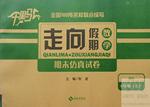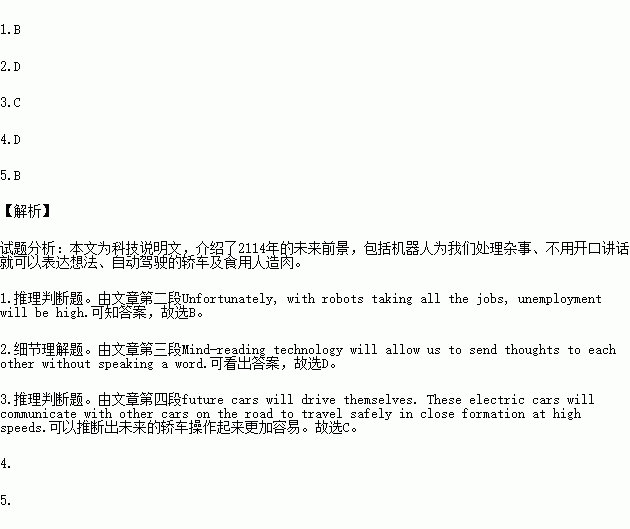题目内容
阅读理解。
It’s exciting to imagine how future humans will have solved the problems we have now, or what amazing new inventions will make our lives more convenient and interesting. We asked top scientists to share their predictions on what the world will be like in a century. If they’re right, the 2114 is going to be really cool.
1. Robots will do your chores and more
Robots will be doing most of our jobs, from building homes to teaching math. There are already robots that clean floors and pump gas. In the future they will be more complicated and useful. Unfortunately, with robots taking all the jobs, unemployment will be high.
2. You will read minds.
Speaking of being social, we will communicate in an entirely different way. Forget texts and emails. Mind-reading technology will allow us to send thoughts to each other without speaking a word. We will also be able to send thoughts to objects around us. (Instead of pressing “start” on the microwave, you could just think “start.”) Meanwhile, chips implanted植入in our brains will improve memory and intelligence.
3. Your car will drive you
Today, around 30,000 Americans die in car accidents each year. One hundred years form now, accidents will be a thing of the past. According to Mark Safford, consultant or the U.S. Department of Transportation, future cars will drive themselves. These electric cars will communicate with other cars on the road to travel safely in close formation at high speeds.
4. You will eat fake meat.
Raising animals is not an efficient way to produce food, and it harms the environment: Cows, chickens, and pigs eat a lot, and then we have to deal with all that poop粪便. What’s more, that poop can up poisoning lakes, rivers, and streams. Today, scientists can “grow” meat in a lab from animal cells, but it’s expensive and not very delicious. In the future, they will have perfected the process. You’ll order hamburgers that come from factories, not cows. Scientists may even find ways to make lab-grown meat tastier and healthier than the real thing.
1. According to the passage, what is likely to happen when robots become more common in the future?
A. People will be much lazier.
B. More people will lose their jobs.
C. People may become physically weaker.
D. More people may become less intelligent.
2.Mind-reading technology will help people to _______.
A. have a good memory
B. talk to other creatures
C. read books efficiently
D. convey messages silently
3.According to the passage, in the future cars will be__________.
A. less popular
B. more expensive
C. much easier to operate
D. much smaller and lighter
4.Future meat will be ________.
A. much more affordable
B. less tasty but healthier
C. more organic and delicious
D. more environmentally friendly
5. What is the passage mainly about?
A. The history of human life.
B. The predictable future life.
C. The development of science.
D. The latest scientific findings.
 千里马走向假期期末仿真试卷寒假系列答案
千里马走向假期期末仿真试卷寒假系列答案

